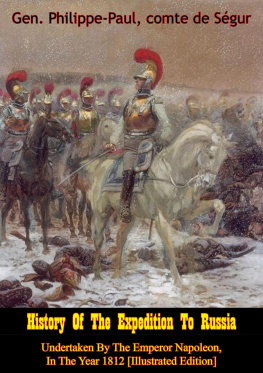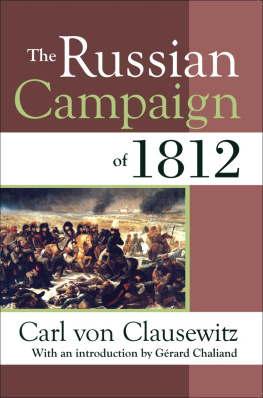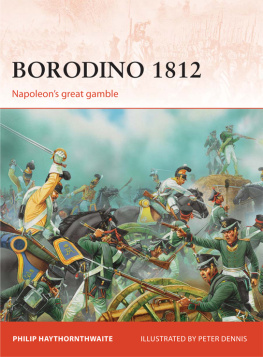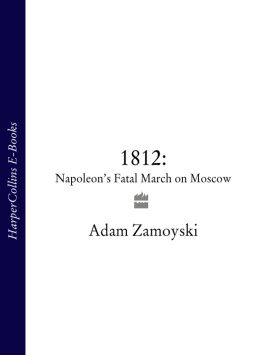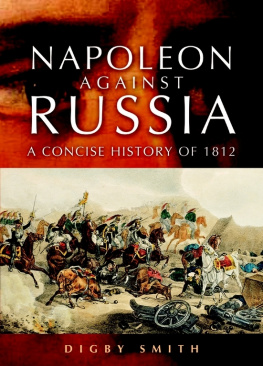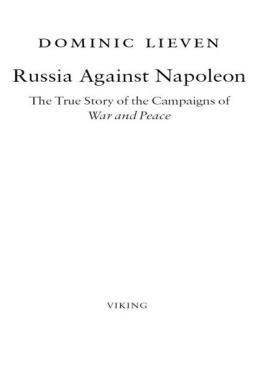Gen. Philippe-Paul comte de Ségur - History of the Expedition to Russia, Undertaken by the Emperor Napoleon, In the Year 1812
Here you can read online Gen. Philippe-Paul comte de Ségur - History of the Expedition to Russia, Undertaken by the Emperor Napoleon, In the Year 1812 full text of the book (entire story) in english for free. Download pdf and epub, get meaning, cover and reviews about this ebook. year: 2016, publisher: Pickle Partners Publishing, genre: History. Description of the work, (preface) as well as reviews are available. Best literature library LitArk.com created for fans of good reading and offers a wide selection of genres:
Romance novel
Science fiction
Adventure
Detective
Science
History
Home and family
Prose
Art
Politics
Computer
Non-fiction
Religion
Business
Children
Humor
Choose a favorite category and find really read worthwhile books. Enjoy immersion in the world of imagination, feel the emotions of the characters or learn something new for yourself, make an fascinating discovery.
- Book:History of the Expedition to Russia, Undertaken by the Emperor Napoleon, In the Year 1812
- Author:
- Publisher:Pickle Partners Publishing
- Genre:
- Year:2016
- Rating:3 / 5
- Favourites:Add to favourites
- Your mark:
- 60
- 1
- 2
- 3
- 4
- 5
History of the Expedition to Russia, Undertaken by the Emperor Napoleon, In the Year 1812: summary, description and annotation
We offer to read an annotation, description, summary or preface (depends on what the author of the book "History of the Expedition to Russia, Undertaken by the Emperor Napoleon, In the Year 1812" wrote himself). If you haven't found the necessary information about the book — write in the comments, we will try to find it.
History of the Expedition to Russia, Undertaken by the Emperor Napoleon, In the Year 1812 — read online for free the complete book (whole text) full work
Below is the text of the book, divided by pages. System saving the place of the last page read, allows you to conveniently read the book "History of the Expedition to Russia, Undertaken by the Emperor Napoleon, In the Year 1812" online for free, without having to search again every time where you left off. Put a bookmark, and you can go to the page where you finished reading at any time.
Font size:
Interval:
Bookmark:


This edition is published by PICKLE PARTNERS PUBLISHINGwww.pp-publishing.com
To join our mailing list for new titles or for issues with our bookspicklepublishing@gmail.com
Or on Facebook
Text originally published in 1825 under the same title.
Pickle Partners Publishing 2016, all rights reserved. No part of this publication may be reproduced, stored in a retrieval system or transmitted by any means, electrical, mechanical or otherwise without the written permission of the copyright holder.
Publishers Note
Although in most cases we have retained the Authors original spelling and grammar to authentically reproduce the work of the Author and the original intent of such material, some additional notes and clarifications have been added for the modern readers benefit.
We have also made every effort to include all maps and illustrations of the original edition the limitations of formatting do not allow of including larger maps, we will upload as many of these maps as possible.
HISTORY OF THE EXPEDITION TO RUSSIA, UNDERTAKEN BY THE EMPEROR NAPOLEON, IN THE YEAR 1812.
BY
GENERAL, COUNT PHILIP DE SGUR.
Quamquam animus meminisse horret, luctuque refugit,
Incipiam.
VIRGIL.
SECOND EDITION, CAREFULLY REVISED AND CORRECTED .
IN TWO VOLUMES,
WITH A MAP AND SEVEN ENGRAVINGS.
VOL. I.
Contents

Portrait of Napoleon
TO THE VETERANS OF THE GRAND ARMY.
COMRADES,
I have undertaken the task of tracing the History of the Grand Army and its Leader during the year 1812. I address it to such of you as the ices of the North have disarmed, and who can no longer serve their country, but by the recollections of their misfortunes and their glory. Stopped short in your noble career, your existence is much more in the past than in the present; but when the recollections are so great, it is allowable to live solely on them. I am not afraid, therefore, of troubling that repose which you have so dearly purchased, by placing before you the most fatal of your deeds of arms. Who is there of us but knows, that from the depth of his obscurity the looks of the fallen man are involuntarily directed towards the splendor of his past existenceeven when its light illuminates the shoal on which the bark of his fortune struck, and when it displays the fragments of the greatest of shipwrecks?
For myself, I will own, that an irresistible feeling carries me back incessantly to that disastrous epoch of our public and private calamities. My memory feels a sort of melancholy pleasure in contemplating and renewing the painful traces which so many horrors have left in it. Is the soul, also, proud of her deep and numerous wounds? Does she delight in displaying them? Are they a property of which she has reason to be proud? Is it rather, that after the desire of knowing them, her first wish is to impart her sensations? To feel, and to excite feeling, are not these the most powerful springs of our soul?
But in short, whatever may be the cause of the sentiment which actuates me, I have yielded to the desire of retracing the various sensations which I experienced during that fatal war. I have employed my leisure hours in separating, arranging, and combining with method my scattered and confused recollections. Comrades! I also invoke yours! Suffer not such great remembrances, which have been so dearly purchased, to be lost; for us they are the only property which the past leaves to the future. Single, against so many enemies, ye fell with greater glory than they rose. Learn, then, that there was no shame in being vanquished! Raise once more those noble fronts, which have been furrowed with all the thunders of Europe! Cast not down those eyes, which have seen so many subject capitals, so many vanquished kings! Fortune, doubtless, owed you a more glorious repose; but, such as it is, it depends on yourselves to make a noble use of it. Let history inscribe your recollections. The solitude and silence of misfortune are propitious to her labours; and let truth, which is always present in the long nights of adversity, at last enlighten labours that may not prove unproductive.
As for me, I will avail myself of the privilege, sometimes painful, sometimes glorious, of telling what I have seen, and of retracing, perhaps with too scrupulous attention, its most minute details; feeling that nothing was too minute in that prodigious Genius and those gigantic feats, without which we should never have known the extent to which human strength, glory, and misfortune, may be carried.
HISTORY OF NAPOLEONS EXPEDITION TO RUSSIA.
Ever since 1807, when the space between the Rhine and the Niemen had been overrun, the two great empires of which these rivers were the boundaries had become rivals. By his concessions at Tilsit, at the expense of Prussia, Sweden, and Turkey, Napoleon had only satisfied Alexander. That treaty was the result of the defeat of Russia, and the date of her submission to the continental system. Among the Russians, it was regarded by some as attacking their honour; and by all it was felt to be ruinous to their interests.
By the continental system Napoleon had declared eternal war against the English; to that system he attached his honour, his political existence, and that of the nation under his sway. That system banished from the Continent all merchandise which was English, or had paid duty in any shape to England. He could not succeed in establishing it but by the unanimous consent of the continental nations, and that consent could not be hoped for but under a single and universal dominion.
France had besides alienated the nations of Europe from her by her conquests, and the monarchs by her revolution and her new dynasty. Henceforward she could no longer look forward to have either friends or rivals, but merely subjects; for the first would have been false, and the second implacable: it followed that all must be subject to her, or she to all.
With feelings of this kind, her leader, influenced by his position, and urged on by his enterprising character, filled his imagination with the vast project of becoming the sole master of Europe, by overwhelming Russia, and wresting Poland from her dominion. He had so much difficulty in concealing this project, that hints of it began to escape him in all directions. The immense preparations which so distant an enterprise required, the enormous quantities of provisions and ammunition collecting, the noise of arms, of carriages, and the march of such numbers of soldiersthe universal movement the majestic and terrible course of all the forces of the West against the Easteverything announced to Europe that her two colossuses were about to measure their strength with each other.
But, to get within reach of Russia, it was necessary to go beyond Austria, to cross Prussia, and to march between Sweden and Turkey; an offensive alliance with these four powers was therefore indispensable. Austria was as much subject to the influence of Napoleon as Prussia was to his arms: to them he had only to declare his intentions; Austria voluntarily and eagerly entered into his plans, and Prussia he easily prevailed on to join him.
Austria, however, did not act blindly. Situated between the two great colossuses of the North and the West, she was not displeased to see them at war: she looked to their mutually weakening each other, and to the increase of her own strength by their exhaustion. On the 14 th of March, 1812, she promised France 30,000 men; but she prepared prudent secret instructions for them. She obtained a vague promise of an increase of territory, as an indemnity for her share of the expenses of the war, and the possession of Gallicia was guaranteed to her. She admitted, however, the future possibility of a cession of part of that province to the kingdom of Poland; but in exchange for that she would have received the Illyrian provinces. The sixth article of the secret treaty establishes that fact.
Next pageFont size:
Interval:
Bookmark:
Similar books «History of the Expedition to Russia, Undertaken by the Emperor Napoleon, In the Year 1812»
Look at similar books to History of the Expedition to Russia, Undertaken by the Emperor Napoleon, In the Year 1812. We have selected literature similar in name and meaning in the hope of providing readers with more options to find new, interesting, not yet read works.
Discussion, reviews of the book History of the Expedition to Russia, Undertaken by the Emperor Napoleon, In the Year 1812 and just readers' own opinions. Leave your comments, write what you think about the work, its meaning or the main characters. Specify what exactly you liked and what you didn't like, and why you think so.

